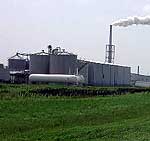By Mary Losure
Minnesota Public Radio
August 21, 2002
Farmers own nearly half the nation's ethanol plants. The plants boost corn prices by creating demand for corn. And by owning their own plants, farmers hope they can capture some of the profits traditionally reaped by commodity processing giants such as Cargill and Archer Daniels Midland.
But now, just as the ethanol industry seems poised for a boom, the farmers who own Minnesota's oldest and largest ethanol plant are thinking of getting out. Stockholders in Marshall, Minnesota-based Minnesota Corn Processors are expected to vote next month on whether to sell their company to Archer Daniels Midland, the nation's largest ethanol producer.
| |
|
|
|
||
These days, the ethanol industry's future looks bright.
California and other states are phasing out MTBE, a gasoline additive that's been found to cause water pollution. They're expected to replace it with ethanol in order to meet clean air standards. Plus, Congress is considering renewable fuels legislation that could triple ethanol use nationwide.
You'd think if anyone were in a good position to benefit from the exploding market for ethanol, it would be the more than 5,000 farmers across Minnesota, Nebraska, Iowa, and South Dakota who invested in a company called Minnesota Corn Processors.
The farmers' cooperative produces 6 percent of the country's ethanol. It's the nation's second largest ethanol producer after Archer Daniels Midland, which makes 41 percent.
But it's not quite that simple.
Minnesota Corn Processors president and CEO Dan Thompson sees a rough road ahead for the company. It nearly went bankrupt a few years ago. Now, he says so many ethanol plants are expanding or under construction that in the near term, ethanol production will far outstrip demand. He doesn't expect MCP to make profits for the next three to five years. And he says many of the company's farmer-shareholders can't hold out that long.
| |
|
|
|
||
"You've got a lot of members that, in their 50s, invested in this company in 1980. They can't sell their stock, there's no liquidity. Now they're 75 years old and so forth, they want to cash out. They need the cash for retirement purposes. No way to do it," Thompson said.
The stock can't sell on the open market because as long as Minnesota Corn Processors remains a farmers' cooperative, shareholders can sell their stock only to other farmers. And Thompson says that's been a huge problem.
"Farmers are in trouble. They don't have the money to buy stock, so there's no farmer buyers out there, so people who want to sell can't. Or if they do, they're forced to sell it at 80 cents a share or some low number," Thompson said.
ADM is offering more than three times that much - $2.90 a share.
"The stories I've heard back from a few of the members - that really warm my heart and touch me - say, 'You just saved my farm. I've got debt and mortgage, I'm 70 years old, this is going to pay it off. I'm not going to have to auction of my farm or sell my land. I'm going to able to walk away from this thing whole,'" Thompson said.
| |
|
|
|
||
If farmers do decide to sell their company, nearly $400 million will flow into rural communities. But farmers like Steve Prokosch will also have to give up what created the company in the first place - the dream of wresting more control of their economic futures from big companies like ADM.
"That's what we wished for when we went into this. We had a couple good years, but it's been pretty break-even the past few years now. We're just hanging on, and hoping for the best here," Prokosch said.
At the Minnesota Corn Processors booth at a recent farm show, stockholders trying to decide how to vote plied CEO Thompson and others from the company with questions. Prokosch says he hasn't yet decided how he'll vote.
"I'm kind of leaning both ways. You've got that thing in the back of your mind to hang on, but we'll see when the day comes," Prokosch said.
Stockholder Jim Warburton farms near Millford, Iowa.
"ADM and Cargill are so big ... that if this gets sold to them, there'll never be another farmer co-op this big. Where are you going to get the money to start with, for one thing? I mean with the farm prices, people don't have extra money to do these kinds of things," Warburton said. "I would just as soon vote no, but if we're not going to make any money for the next few years - I mean, when is it going to turn?"
|
"ADM and Cargill are so big ... that if this gets sold to them, there'll never be another farmer co-op this big. I would just as soon vote no, but if we're not going to make any money for the next few years - I mean, when is it going to turn? "
- Jim Warburton, a stockholder of Minnesota Corn Processors |
Mike Mart of Esterville, Iowa, does know how he's going to vote.
"I'm going to vote (to) sell out! I give up to them guys," Mart said.
The proposed sale has prompted more than just regrets. It has also caught the attention of lawmakers.
California Sens. Dianne Feinstein and Barbara Boxer, New York Sen. Hilary Clinton and others have called for a Justice Department investigation.
A statement by the senators charges that ADM's purchase of its nearest rival could "move ADM closer to a monopoly in an already dangerously anti-competitive market," with "severe repercussions on the price and supply of ethanol."
Sen. Feinstein's office told MPR she was traveling and unavailable for an interview. Archer Daniels Midland did not return phone calls in time for this story.
Minnesota Corn Processors CEO Dan Thompson says he doesn't expect the senators' request will make much difference.
"The California senators and all asking for an investigation is rather ridiculous. It's automatically reviewed by the Department of Justice - it doesn't take a senator asking. So it's politically-driven motivation about anti-ethanol in California. The Justice Department's reviewed it. They don't think this will be an anti-competitive project. We will get Department of Justice approval, we've already been indicated," Thompson said.
Minnesota Corn Processors board chairman Jerry Jacoby points out that even if the deal goes through, ADM's share of the nation's ethanol production will actually go down in coming years. Already this year, the industry has expanded its capacity by 10 percent. And farmers, not big companies like ADM and Cargill, are the ones doing it.
Jacoby is a corn farmer himself, and he hopes these new plants succeed. But he cautions that farmers have to realize what they're up against.
"ADM has deep pockets, and they're here to stay. They've got the cash to ride through a low cycle, no matter how long it is. If other farmers want to build ethanol plants and the market expands and grows like we all hope it will, super duper. But I would caution them to make sure they have the financial wherewithal to stick with the program over the long term," Jacoby.
If they don't have what it takes, in coming years ADM may have the opportunity to buy a few more ethanol plants.
More from MPRMore Information



